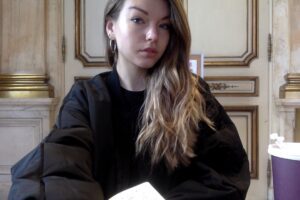The Association for the Advancement of Baltic Studies is pleased to announce that Megija Mīlberga has been awarded the 2023-2024 Baumanis Grant for Creative Projects in Baltic Studies.
The Baumanis Grant is an award made to honor Velta Marija Baumanis of Mount Brydges, Ontario, who left a generous bequest to AABS at the end of her career as an architect. An award of up to $7,000 is available for any creative project (e.g., book, film, exhibit, etc.) that promotes Baltic studies. Preference is given to topics with a pan-Baltic or comparative aspect. Applicants must be members of the AABS at the time of application.
The 2023 applications were evaluated by the AABS 2022–2024 Grants Committee consisting of AABS VP for Professional Development Dr. Kaarel Piirimäe, AABS President Dr. Dovilė Budrytė, and AABS Director-at-Large Dr. Daunis Auers, and AABS Treasurer Uģis Sprūdžs, CFA.

© Megija Mīlberga
Megija Mīlberga is an art historian. She holds a B.Sc. in Economics from the Stockholm School of Economics in Riga and an M.A. in Cultural Studies from KU Leuven. She is the recipient of the Fulbright Foreign Student Fellowship for M.A. studies in History of Art and Archaeology at The Institute of Fine Arts, New York University. Mīlberga is currently a doctoral candidate at The Institute of Fine Arts, NYU, studying modern and contemporary art and architecture in Eastern Europe. Her dissertation will interrogate site-consciousness as a tool of insurgent citizenship in Soviet-era architecture in the Baltic states.
She has gathered work experience organising Latvia’s participation at the 58th International Art Exhibition – La Biennale di Venezia; at Kim? Contemporary Art Centre in Riga, as well as Rupert artist residency in Vilnius. Her recent publications include an exhibition text for Sabīne Vernere’s show, as well as reviews and interviews in local press.
Project Abstract
In the three Baltic states, Putin’s invasion of Ukraine has accelerated public disdain towards any physical manifestation of the Soviet occupation and has re-actualized discussions about dismantling vast amounts of Soviet-era constructions. In the face of conscious neglect, there exists an imperative to reframe the discourse surrounding Soviet art and architecture as polyethnic and multinational, thus moving away from Russo-centric and hegemonic definitions of Soviet identity.
During the project, I aim to interrogate the relationship between landscape and Soviet architecture in the Baltic states. I will focus this inquiry on a wide range of projects that craft either optical or material relationships to landscapes – nodding to examples such as collective farm complexes in Estonia designed by Valve Pormeister and Toomas Rein; summer house by Modris Ģelzis in Pabaži (Latvia) or the Lazdynai housing project in Vilnius (Lithuania), among others.
This project falls within the broader scope of my doctoral research, conducted at the Institute of Fine Arts at New York University. The aim of the project is to develop a photography series in collaboration with a Latvian photographer, documenting select architectural sites from all of the Baltic countries, interrogating their relationship with the landscape. The process of exposing these structures to the scrutiny of a young Latvian photographer invites a curious dialogue that seeks to interrogate notions of place-hood, Baltic landscape and dissent. The developed series would be first presented as an independent photo exhibition in Riga in August 2024 and, second, would form a crucial visual dataset for my doctoral research that would accompany the final publication.
The findings will contribute to our understanding of how socialism functions as an ideological nexus that expands and delimits the role of architecture; as well as delineate the unique aesthetic character of the Baltic Three. In addition to approaching these cases as instances of dissident-architecture, the project aspires to situate attentiveness to landscape in a legacy of Baltic vernacular architecture, contributing to broader discussions about the strategies of insurgent citizenship (James Holston) in the urban realm, as well as critical regionalism (Kenneth Frampton).
-Megija Mīlberga
